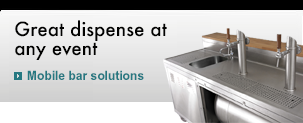Drinks dispense technician - Level 3 Apprenticeship
| Qualification | No qualification attached to this standard |
| Level | 3 |
| Length | 15 months (excluding end point assessment) |
| Delivery | Block release |
| Entry requirements | Determined by the employer |
| Maths and English | Apprentices without Level 2 English and/or maths will need to achieve this level prior to taking the end point assessment. For those with an education, health and care plan or a legacy statement, the apprenticeship’s English and maths minimum requirement is Entry Level 3. A British Sign Language (BSL) qualification is an alternative to the English qualification for those whose primary language is BSL. |
| Apprentice assessment | A qualified assessor will provide an induction and regular one-to-one reviews |
| Progression | Full time engineer, site supervisor, team leader |
| Employer support | A dedicated account manager will guide and support employers throughout the programme. |
Apprentices will develop knowledge of:
- Drinks dispense system installation, commissioning and decommissioning requirements including site survey, system components, system limitations, testing.
- Drinks dispense system maintenance requirements and techniques including fault-finding, troubleshooting, diagnostic techniques, repair, total preventative maintenance, testing; common faults and causes.
- System specifications for example, keg, cask, soft drinks, nitro coffee, frozen, carbonated, manufacturer specifications, temperature, gas type, flow speed, couplers, post-mix; what they are, the effects they have and how to use them.
- Brand/drink specifications including pipework and plumbing, temperature, gas pressures, fluid mechanics/dynamics, management, composition, characteristics, brewing process, ingredients, cask ale conditioning, manufacturers’ specification, stock rotation; what they are and how to use them.
- Electrical systems including polarity testing, codes, portable appliance testing (PAT), use of a multimeter; principles of electricity, voltage, types of current: alternating current/direct current (AC/DC).
- Refrigeration principles, types of refrigerant, integral and split systems, requirements relating to hydrochlorofluorocarbons (HCFCs), both gas and water-cooled systems.
- Drinks dispense system pipework including different materials, joints and routing; requirements including length and building restrictions.
- Asset management, including identification of equipment/parts, value of stock and equipment, correct handling of parts, salvageability of parts to be removed, returns process, disposal.
- Stock management for example stock requirements, lead times, and stock management systems.
- Proper tool usage including hand tools, power tools, carbonation tester, refractometer, ratio cup, gas monitors, hygrometer, pressure gauges, CO2 monitors, correct/appropriate tool selection.
- Cleaning (line & glass) including different systems, symptoms of infected/contaminated line, cleaning process, health and safety dangers, fault-finding, effect of bacteria in lines, the need for effective pest control around products and manufacturers guidelines.
- The perfect pour, for example how to create one, problem solving when pours are imperfect e.g. cleaning of vessels/glassware, operation of glasswashers and icemakers.
- Codes of Practice (COP) and guidelines, including British Soft Drinks Association, British Beer and Pub Association, Brewing Food & Beverage Industry Trade Association, Brand Dispense Association, British Soft Drinks Association electrical guidelines, British Beer and Pub Association electrical guidelines, brand matrix, Brands Dispense Association Drinks Installation Manual.
- Legal requirements and compliance including authority to work, trading standards, transport regulations (e.g. overloading, gas canisters), ullage (RBUS - return beer unfit for sale), general data protection regulations (GDPR), electric compliance, pressure systems compliance.
- Health and safety including Control of Substances Hazardous to Health (COSHH), Risk Assessment, method statements, manual handling, personal protective equipment, asbestos, confined spaces, working at height, Construction Skills Certification Scheme (CSCS) compliance, food hygiene, vehicle safety.
- Environmental considerations including Waste Electrical and Electronic Equipment Directive (WEEE), recycling, fluorinated greenhouse gas (F Gas).
- Planning techniques including time management skills, workflow (e.g. job acquisition point).
- Improvement techniques including the 5 S’ (sort, set, shine, standardize and sustain), PDCA (Plan, Do, Check, Act).
- Training, mentoring and coaching techniques: how to pass on knowledge, and provide guidance to customer/stakeholder, in a clear, concise and easy to understand manner.
- Team leadership and management techniques.
- Equality and diversity in the workplace considerations.
- Professional relationships including etiquette; expectations, responsibilities.
- Documentation requirements, for example job sheets, bar records, written scheme of examination, vehicle safety checklist, cleaning logs.
- Information technology, for example processing software, email systems, handheld devices, job management systems, asset tracking systems.
- Service Level Agreements for example employer/employee responsibilities, limitations, commercial contracts (e.g. expectations, response times).
- Industry insight, for example appropriate timing, peak business hours, local geography, parking restrictions, access, dispense system ownership (Must Buy Must Sell system), position in supply chain, identity of stakeholders and motivations.
Apprentices will develop skills to enable them to:
- Interpret, follow and adhere to Service Level Agreements, legal requirements, COPs, specifications and customer needs.
- Plan, organise and schedule own/others' work for example task delegation, workflow, route planning, time management.
- Conduct site survey, including risk assessments.
- Interpret job requirements for example job specification, technical drawings, instruction booklets, identifying trends.
- Determine and source resources for example materials, time and equipment.
- Manage stock levels.
- Plumb pipework for drinks dispense equipment or components.
- Conduct electrical installations or maintenance of drinks dispense equipment or components.
- Install or maintain refrigeration components for drinks dispense equipment.
- Install or maintain gas dispense pressure system.
- Operate tools and instruments for example drills, power tools, spirit levels, specialist tools/instruments.
- Commission and connect specified equipment and/or components in adherence to Service Level Agreements, legal requirements, COPs, specifications and customer needs.
- Assess condition of components and equipment and identifying action.
- Decommission and disconnect specified equipment or components in adherence to Service Level Agreements, legal requirements, COPs, specifications and customer needs.
- Diagnose dispense, product or equipment faults and identify solutions.
- Test equipment and quality assure product dispensed, for example sampling final product.
- Clean lines, vessels and/or other equipment.
- Categorise decommissioned equipment for reuse, disposal or recycling.
- Pack decommissioned equipment to prevent further deterioration/damage.
- Isolate and document unsaleable product for return, destruction or further investigation.
- Complete documentation for example asset management records, work sheets, waste environmental records.
- Collect, record and provide data, for example pressure readings, stock usage.
- Communicate with stakeholders, internal or external for example customers, colleagues, managers, general public.
- Provide information, guidance or training to colleagues and/or stakeholders.
- Conduct all duties in adherence with health and safety directives and environmental policy and procedures.
Apprentices will demonstrate the expected workplace behaviours:
- Health and safety-first attitude.
- Reliable, for example, acts with integrity, punctual, meticulous, trustworthy, honest, determined, perseveres.
- Adaptable, for example, responds to unforeseen circumstances, improvises in environment or time challenged conditions, resilient under pressure.
- Takes responsibility for job, for example, a desire to see a job through from start to finish and verify that it has been completed to a high standard.
- Quality focus for example attention to detail, accuracy, customer orientated, implements quality and lasting repairs.
- Professional, for example, represents themselves/employer well, presentable, passion for product, ambassadorial nature, instils confidence.
- Team player, for example works with others toward a common goal, with an obvious willingness and positive attitude, has regard for equality and diversity consideration.
- Maintains a commitment to continuous professional development in order to ensure growth in ability and standards of work.
How to apply
To apply for this position, please download an application form and forward with covering letter to info@celligroup.com or send to:
Celli Asset Management (UK) Ltd (Recruitment)Riverside Industrial Estate
Atherstone Street
Fazeley
Tamworth
B78 3RW




